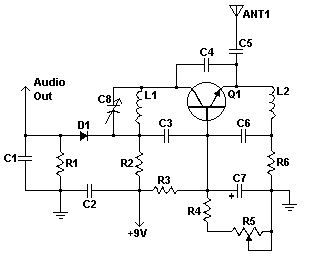Ive been Building little circuits for a while now im still a newbie at the stage of understanding what each component is how the circuits are built, but still learning on the actual workings and value of the layout of circuits, I have built some sensors, amps, audio devices, and FM transmitters with gr8 success.
One idea that has fascinated me is the idea of building a receiver circuit for frequencies outside the normal commercial band 88 - 108 Mhz, for example a receiver that picks up civil air band 108-138Mhz or even military air band 230 - 420 Mhz.
I have searched the web time and time again with little success, when I do these searches, one Schematic keeps cropping up

i had planed to build this in time when I have all the components, however a bit put of by comments stating some of those used in this circuit are hard to come by.
Im interested to know if this circuit looks accurate for use in the uk, and if anybody can tell me how difficult creating receivers for the above bands would actually be to build. My relatively tiny experience on RF circuits is making me assume if an FM or AM commercial band receiver can be created relatively easy, will one for different bands be much more difficult. ???
any info would be very useful
cheers

